"We go beyond research with partners. Together, we're making sure that JPFA members, consisting of growers, suppliers, and individuals, fully understand vertical farming before they start anything. We are aiming to bridge the gap between science and corporates," says Eri Hayashi, President of the Japan Plant Factory Association (JPFA), and Nozumi Hiramatsu, Manager of International Relations and Consulting as they are giving us a grand tour of the Kashiwanoha Campus of Chiba University located approximately one hour from Tokyo.
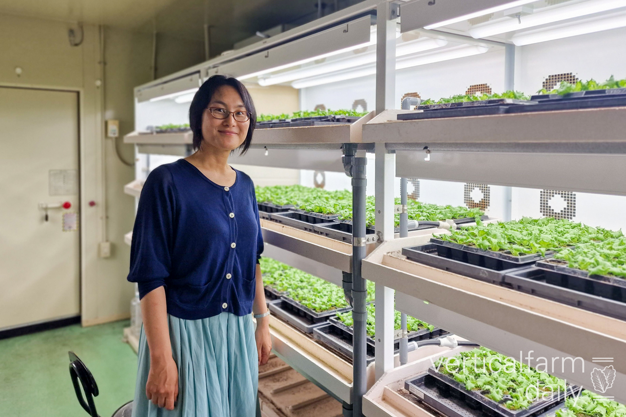
Eri Hayashi
Although the name might make you think so, the JPFA is not tied to vertical farming only as they have various research projects that are taking place in greenhouses. The JPFA is known for its hands-on, research-based workshops on vertical farms and greenhouses, of which an English course by specialized lecturers from academia and industry will be scheduled again this October, including a visit to 808 Factory and Mirai. On top of that, last year, the JPFA organized its first international symposium which is set to return in September 2025 in near Tokyo due to high demand.
Click here to view the complete photo report.
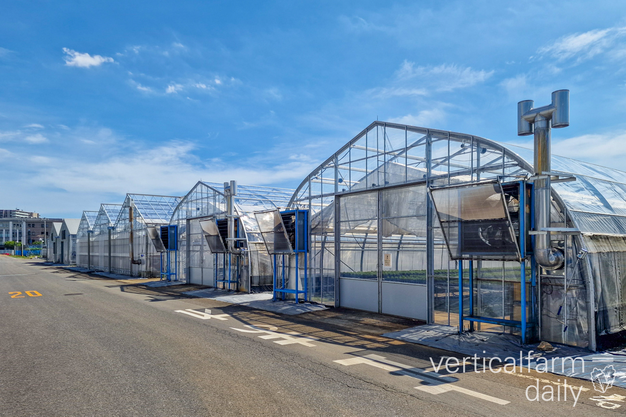
A part of the Kashiwanoha Campus of Chiba University where the JPFA is headquartered and conducts most of its co-research
Located on the premises of Chiba University, the JPFA team manages a set of greenhouses and vertical farms. "Mainly, we are working on research and delivering knowledge. For every research facility on-site we have a different role, as we run various experiments with the companies. Our role is to introduce members and others to new science projects, connect them to industry players, government- or municipality officials, and potential parties to work with," Eri explains.
Despite the extreme heat waves, the greenhouse operators are coping and trying to introduce new ideas to remedy the heat and cooling costs. "Some are growing different crops throughout the year to find suited to the growing environment and mainly in a preferred climate of a crop." Besides the various ongoing projects, some members are doing collaborative research as they often come out beneficial for all parties involved.
Click here to view the complete photo report.
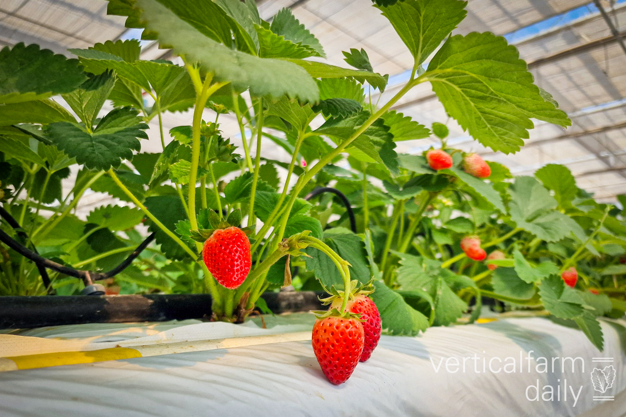
A strawberry trial held by Yanmar
Combining research and science
Each research or pilot facility is designed to be at the proper scale so a decent amount of produce can be cultivated, tested, and eventually sold outside of campus at a good price. There are quite some companies, JPFA special members, who are piloting their solutions on the premises and using them to their advantage to eventually scale out, working closely with the JPFA and Chiba University, and eventually, ready to enter the market.
"Often, potential clients are invited to the campus to showcase the opportunities that are laid out here. Companies have the chance to work closely with the growers to pilot, and expand product or market knowledge."
Amongst product testing and market research, sustainability is a big focal point. Aiming to create ecosystems on-site and future sites, resource recycling and potentially the use of renewables are applied to prevent excessive waste.
Click here to view the complete photo report.
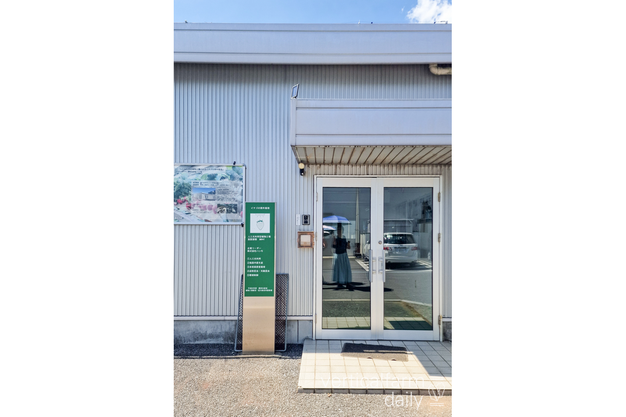
Hanmo's research facility
Research project highlights
Startup Hanmo is tackling year-round strawberry production and running tests in vertical farms to find the best-growing recipes to achieve that in Japan the season starts in December and ends in May with mainly greenhouse production. By growing from the seed, Hanmo is keeping insects and diseases away which makes the young plants more eligible for exports and enables long-period cultivation without pesticide.
For the past three years, they have been using the same mother plants in four layers and thus far the results have been promising. A popular harvesting model in Japan is picking quality fruits first to sell them at higher prices, and later having consumers pick as many berries as they want for a set price, which saves massively in labor costs.
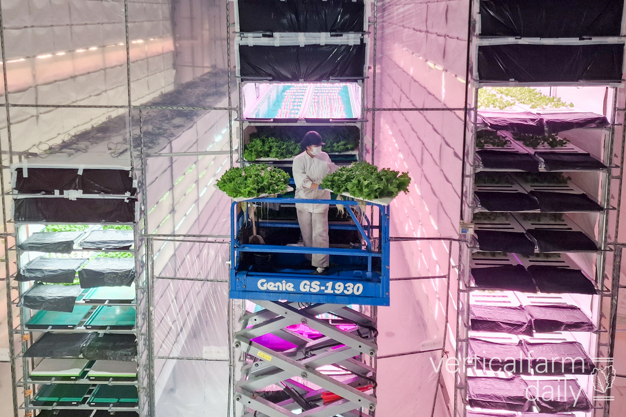
Obayashi's trial facility
Obayashi, one of the largest engineering companies in Japan, has been doing cultivation trials to improve its system ever since the start. The latest project is looking into the impact of automation. It's not mainly about the implementation of robotics, but also the influence of automation in each handling process and how it contributes to labor cost and productivity.
Producing over six lettuce varieties and herbs, locals can find them in regional stores. With plans to eventually construct their farms, this pilot facility serves as a great proof of concept for Obayashi.
Click here to view the complete photo report.
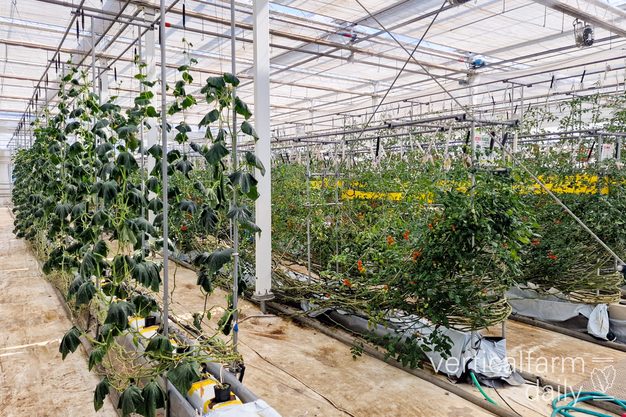
Yanmar's cucumber trial
Yanmar, a large agricultural machinery manufacturer, is running various trials in its greenhouse and vertical farm facilities. In their closed farm, a strawberry trial is taking place, for which absorption fabric is used which is a natural irrigation method. Soaking up liquid fertilizer, the fabric keeps the soil in definite moisture content which the crop's roots absorb as much as is needed.
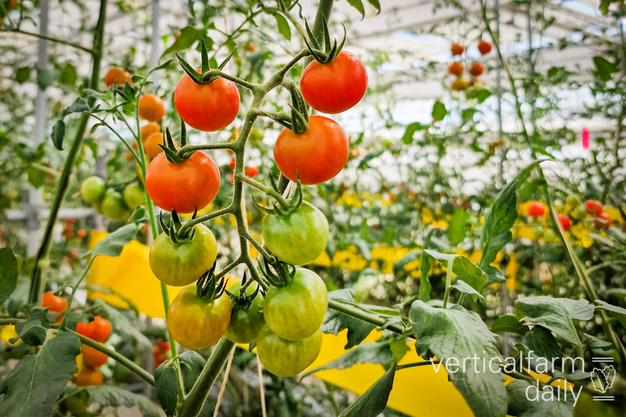
Tomato trial
Originally designed for tomato plants, Yanmar is now testing the efficiency of strawberry plants in vertical farms as they aim to move into more sustainable substrate alternatives. They also started to test their conveying system for berries, which has been ordered to be installed in five large domestic greenhouse operators which will adopt them for propagation purposes.

The strawberry trial
As for the strawberry trials in a greenhouse, the company has dedicated its system to cooling by cooling the roots instead of the 'direct' growing environment. "We're analyzing whether its root cooling is more efficient than cooling the greenhouse environment since many growers are looking for affordable innovations to lower OpEx. The plant roots seem to be very happy about it and for us, it's been very convenient to just change temperatures in the root zones other than the entire greenhouse. Thus far it has been a cheaper alternative. However, it should be noted that the cooling system could end up being more costly than the entire greenhouse itself so that's something we'll be improving over time," Siqin Batu, Yanmar research lead shared.
Besides the greenhouse trials, startups like LeafLab, Especmic, Mitsubishi Aqua Chemical Aqua Solutions, Planet Co., and Ikeuchi are conducting numerous research pilots behind the scenes of which more will follow soon.
Click here to view the complete photo report.
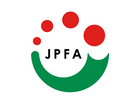 For more information:
For more information:
JPFA
Eri Hayashi, President
info.english@npoplantfactory.org
https://npoplantfactory.org/en
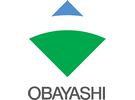 Obayashi Coproration
Obayashi Coproration
www.obayashi.co.jp
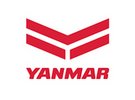 Yanmar
Yanmar
www.yanmar.com
